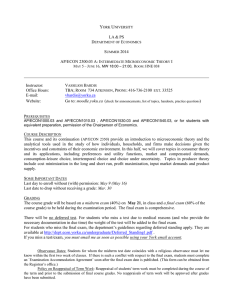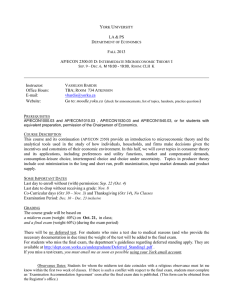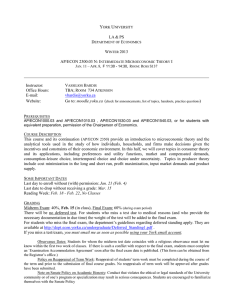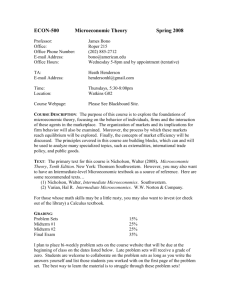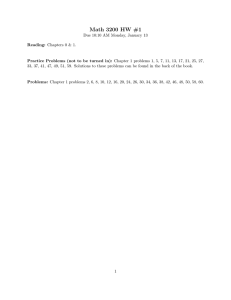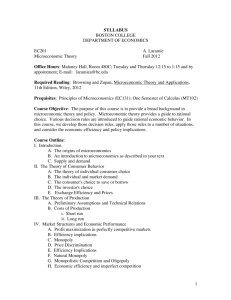Y U
advertisement
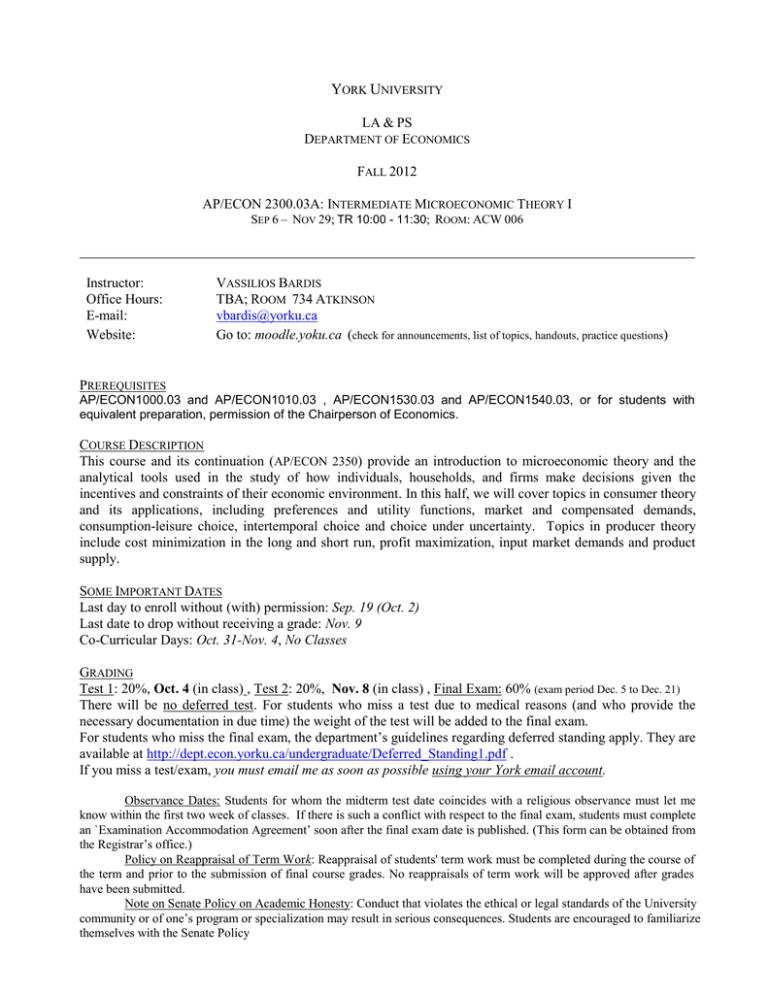
YORK UNIVERSITY LA & PS DEPARTMENT OF ECONOMICS FALL 2012 AP/ECON 2300.03A: INTERMEDIATE MICROECONOMIC THEORY I SEP 6 – NOV 29; TR 10:00 - 11:30; ROOM: ACW 006 Instructor: Office Hours: E-mail: Website: VASSILIOS BARDIS TBA; ROOM 734 ATKINSON vbardis@yorku.ca Go to: moodle.yoku.ca (check for announcements, list of topics, handouts, practice questions) PREREQUISITES AP/ECON1000.03 and AP/ECON1010.03 , AP/ECON1530.03 and AP/ECON1540.03, or for students with equivalent preparation, permission of the Chairperson of Economics. COURSE DESCRIPTION This course and its continuation (AP/ECON 2350) provide an introduction to microeconomic theory and the analytical tools used in the study of how individuals, households, and firms make decisions given the incentives and constraints of their economic environment. In this half, we will cover topics in consumer theory and its applications, including preferences and utility functions, market and compensated demands, consumption-leisure choice, intertemporal choice and choice under uncertainty. Topics in producer theory include cost minimization in the long and short run, profit maximization, input market demands and product supply. SOME IMPORTANT DATES Last day to enroll without (with) permission: Sep. 19 (Oct. 2) Last date to drop without receiving a grade: Nov. 9 Co-Curricular Days: Oct. 31-Nov. 4, No Classes GRADING Test 1: 20%, Oct. 4 (in class) , Test 2: 20%, Nov. 8 (in class) , Final Exam: 60% (exam period Dec. 5 to Dec. 21) There will be no deferred test. For students who miss a test due to medical reasons (and who provide the necessary documentation in due time) the weight of the test will be added to the final exam. For students who miss the final exam, the department’s guidelines regarding deferred standing apply. They are available at http://dept.econ.yorku.ca/undergraduate/Deferred_Standing1.pdf . If you miss a test/exam, you must email me as soon as possible using your York email account. Observance Dates: Students for whom the midterm test date coincides with a religious observance must let me know within the first two week of classes. If there is such a conflict with respect to the final exam, students must complete an `Examination Accommodation Agreement’ soon after the final exam date is published. (This form can be obtained from the Registrar’s office.) Policy on Reappraisal of Term Work: Reappraisal of students' term work must be completed during the course of the term and prior to the submission of final course grades. No reappraisals of term work will be approved after grades have been submitted. Note on Senate Policy on Academic Honesty: Conduct that violates the ethical or legal standards of the University community or of one’s program or specialization may result in serious consequences. Students are encouraged to familiarize themselves with the Senate Policy TEXTBOOKS (OPTIONAL) There is no required textbook. There are several good textbooks, including the following: 1. Hal Varian, Intermediate Microeconomics A Modern Approach, 8th Edition, W. W. Norton & Company, Inc. (RECOMMENDED) 2. Walter Nicholson, Microeconomic Theory : Basic Principles And Extensions, 9th ed. Mason, Ohio : Thomson/South-Western, c2005. 3. Walter Nicholson, Christopher Snyder, Intermediate Microeconomics And Its Application, 10th ed. Mason, Ohio : Thomson/South-Western, c2007. 4. McAfee, R. Preston (2005) Introduction to Economic Analysis. Self-Published , Pasadena, CA. ISBN 160049000X (Unpublished) http://resolver.caltech.edu/CaltechBOOK:2005.002 (Free Book) LIST OF TOPICS (BOOK 1 CHAPTERS APPEAR IN PARENTHESES.) Introduction (Chapter 1) Consumer Theory (2, 3, 4, 5, 6, 7, 8, 9, 10, 12, 14, 15) Budget Constraint (Chapter 2) Preferences, Utility Functions, Indifference Curves, MRS (Chapters 3, 4) Utility Maximization and Market Demands (Chapters 5, 6, 15) Expenditure Minimization and Compensated Demands (Chapters 7, 8, 14) Income and Substitution Effects: The Slutsky Equation (Chapters 7, 8, 14) The Endowment Model and Applications (Chapter 9, 10) Consumer Choice under Uncertainty (Chapter 12) Producer Theory (18, 19, 20, 21, 22) Production Functions, Isoquants, Marginal Products, Returns to Scale Firm Costs, Cost Minimization, Conditional Input Demands, Cost Functions Short Run vs Long Run Costs Profit Maximization in Input Space and Output Space Firm and Industry Supply, Profit and Producer Surplus
